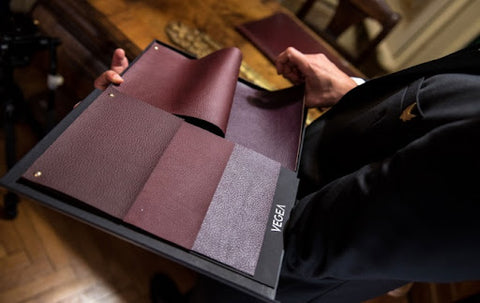In a global survey conducted by U.S. News in 2016, Italy was voted the most fashionable country. At surface level it may seem that Italy’s manufacturing sector is deep rooted in the ethics of craftsmanship with impeccable tailoring renowned since the 11th century and less about sustainability, while its export of animal products such as premium cashmere and leathers.
As climate crisis continues to dominate news headlines, wholeheartedly spawned by UN Gen-Z panelists including Swedish eco-activist, Greta Thunberg, and since Covid-19, Italy’s major leather export has taken a sharp decline. TradingEconomics.com reported that in July 2019 it was valued at €2428.99 million and dropped to an all-time low of €369.98 million in 2020.
While Italy’s science and technology sectors have developed leading edge materials like recycled ocean waste into durable, stretch material called Econyl by Aquafil Global and renewable, plant-based leathers from the Vegea lab, its export of circular materials must continue to compete with and overtake the volume of animal byproduct export.

Leading creative and product development for Italian furniture manufacturer, Natuzzi Group is Pasquale Jnr., who is committed to ecological responsibility. The brand announced in its 2018 stakeholder report its goal to reduce CO2 emissions by 17,000 tons. Pasquale Jnr. says “We only use wood from responsibly managed forests that are FSC® certified. Natuzzi demonstrates leadership in sustainable development and is nothing shy of pioneering, a term that best describes the young entrepreneur whose early career motivations were luxury fashion startups. He further explains “for padding, we use Ecoflex® ecological polyurethane foam, patented and produced exclusively by Natuzzi in a company-owned factory, without Freon or other harmful blowing agents.”

On a smaller scale production yet harnessing the same attitude toward environmental footprint, Italian furniture brand D3CO explains, “we are furniture makers and we are family. We strive for a healthy home [and] a safe place for our children. Through our natural production process, we contribute to saving our planet, so that it may be worth living on.” Their list of home products are 100% biodegradable (plastic free) and use 100% natural textiles that are awarded the Oeko-Tex standard and certification. D3CO’s partners also invest in education by sharing their methods at the University of Bologna and the Academy of Visual Arts of Frankfurt, ensuring that the future of manufacturing prioritizes ecology.

The European Commission released a report in 2019 stating that, “circular economy and eco-innovation developments in Italy largely relate to eco-labeling, waste management, bio-economy and green industry. In fact, Italy has one of the highest levels of eco-labels and EMAS in the EU. According to the 2019 Report on circular economy in Italy, the country ranks first on waste management performance. Italy is also a leader in bio-economy, especially in the food and beverage sector. In addition, circular economy is increasingly becoming an important component of the country’s industrial policy.”
With associations such as the Sustainable Fashion Innovation Society and its Eco Fashion EXPO experiencing national and international demand from sponsors, it seems Italy is taking heed. The association is led by veteran environmental and wellness author, Valeria Mangani, who serves as representative International Alliance of Women (IAW) for several United Nations institutions and Councilor proposing Bills for the promotion of the fashion sector in Parliament (2021).
Mangani explains, “Fashion begins with agriculture and ends in communication. The disruption of the fashion sector through the sustainable transition can be ridden through a qualitative and stylistic virtuosity that has always distinguished us on a global level. The beautiful and well done is in the DNA of made in Italy.”
The emergence of sustainability development in Italy is tipped as a competitive growth market thanks to non-profits like the Sustainable Fashion Innovation Society; activists like Valeria Mangani fighting for Government budget increases for science and technology; and industrialists like the Natuzzi Group who continue pushing renewable energy and pioneering plant-based leather substitutes. Supporting these organizations, Policy makers and engineers will help to evaporate demand for unethical fabrications like animal leather synonymous of Italian export, incentivizing social welfare while strengthening the nation in its pursuit of leading in bio-economics.

Shop our Grape-Leather collection, designed in New York, engineered in and shipped from Italy.
Words by Bethanie Ashton -fashion consultant for eco-transformation, transparency roadmap and VIP dressings.
Source:
-P1 Italy most fashionable country – U.S. News
-P2 Italy’s leather export statistics – TradingEconomics.com
-P4 Pasquale Junior Natuzzi comments – Whitewall Magazine Interview
-P5 Italy’s bio-economy efforts - European Commission report 2
Source:
-P1 Italy most fashionable country – U.S. News
-P2 Italy’s leather export statistics – TradingEconomics.com
-P4 Pasquale Junior Natuzzi comments – Whitewall Magazine Interview
-P5 Italy’s bio-economy efforts - European Commission report 2019
